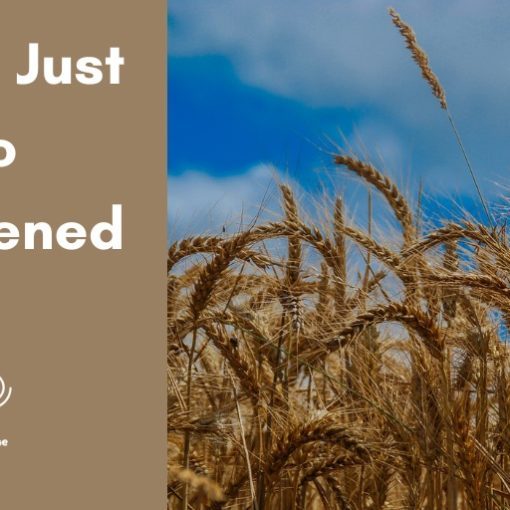We can all carry too many worries, anxieties, and cares, but when we learn how to cast, we can find a new sense of wholeness, peace, and shalom.
‘That is a lot you are carrying,’ I said as they paused and took a breath.
So many worries, thoughts, and distractions going around in their head. It was, as someone described it, a monkey mind. Clattering noisy monkeys vying for your attention in the cage of your brain.
I had given them room to voice the noise, and only a little had slipped out.
For many of us, we have become so used to the noise of worry that we think it’s normal.
When someone asks how we are, we would never consider sharing something of the monkey chatter. It’s just there, in the background, part of the ambient background noise we live in.
But all that noise can wear us down. A kind of fatigue sets in, and worry has its well-worn path to depression.
If you are depressed you are living in the past.
If you are anxious you are living in the future.
If you are at peace you are living in the present.
The Wholeness of Shalom
Years ago, I listened to a talk by Tom Sine about Shalom, the Hebrew word for peace.
Shalom is not just an ending of hostilities but more so a coming together to a place of wholeness.
A ‘completeness’ of self where there are no fractures or splinters of distraction.
Shalom refers to a sense of harmony, wholeness, completeness, prosperity, welfare, and tranquility.
Many of us live far away from this place of wholeness. Peace is a lovely idea, but it seems like a distant dream for another time.
We get tastes of shalom every now and then, but they are fleeting, and we are back into the pendulum swing of anxiety and depression.
The fractured life of the anxious
It’s interesting to dig into the meaning of the word anxiety in biblical greek.
The word ‘merimna’ is used.
mérimna – a part, separated from the whole; (figuratively) worry (anxiety), dividing and fracturing a person’s being into parts.
We have the picture of one that has a distracted life—so many parts to them.
The image of one of those entertainers with multiple spinning plates on long poles comes to mind. We are jumping from pole to pole to keep everything moving and not have a plate wobble, tilt, and fall to the floor.
We try and control. We run from this anxious thought to the next.
The call to cast
Recently I was watching a young lady ride a horse. She and the horse were one. There was a wholeness.
Before the ride, she had got her saddle and, with a fluidity of motion, had cast it up and onto the waiting horse. She had done this many times.
She knew the weight of the saddle and the need to have a rhythm to her movement. Being quite short, compared to her horse’s height, it took effort and focus for her to cast her load easily.
In one of the passages in the Bible about anxiety and worry, we find Peter, a close friend of Jesus, calling us to cast.
Cast all your anxiety on him, because he cares for you. 1 Peter 5:7
That same word ‘cast’ (epiriptó – greek) is also found in the story of when the followers of Jesus cast their cloaks onto the back of a donkey, so Jesus had a comfortable ride.
They brought it to Jesus, threw their cloaks on the colt, and put Jesus on it. Luke 19:35
The object of one’s care.
What is it like to be cared for? To have someone show genuine unconditional love towards you.
This care might be found in a few simple words such as ‘How are you?’ but genuine care goes deeper into a sense of letting you cast some of the weightiness of your life onto their shoulders for at least a moment.
To be the object of one’s love and care is something nearing wholeness or shalom. It means that you are not alone with your monkey mind.
How remarkable is it that we are the ‘object of one’s care’ when we consider God?
‘For he cares about you’ is not simply a nice warm fuzzy devotional idea. It is an active, passionate fact.
There is a desire in the heart of God for you to come close and to cast the fractured reality of your life upon their back.
Learning the rhythm of the cast
As I watched that young lady cast her saddle up on the horse’s back, I knew that she had done this many times.
Probably as a young rider, she would have had a coach show her how to prepare the horse, where to hold the saddle, where to place her feet, and how to swing. It came naturally to her body now. She could probably do it blindfolded.
There is a rhythm to our ‘casting our cares upon the Lord’.
It’s a spiritual practice of noticing, recording, and casting.
- Noticing
What are the anxious paths you are regularly taking? You may not even see them as places of worry because they are so familiar to you. The little things you fret over that keep you away from a sense of wholeness and shalom.
Check out your ‘Red Dot.’ - Recording
Write them down in a journal. Getting these worries out of the brain and onto paper is a pragmatic step of ownership and awareness. It’s an isolating of the monkey apart from the noise of the monkeys. This recording can be the first step towards problem-solving. - Casting
We have noticed, and we have recorded. Now, can we cast them?
Casting involves the asking of God to carry the weight for you. To throw the worries, as such, onto the back of a giant Clydesdale horse that can handle anything coming to them. This is not an avoidance strategy of shifting responsibility. It’s more a partnership with the eternal so that the emotional weightiness of the burden can be carried. This frees you up cognitively to have space and quiet. Perhaps as Clydesdale God carries the weight, new possibilities and solutions open up to your imagination.
This week begin to notice the little noises and worries that seem to snipe at your feet. The nervous worries that seem to drive your life. Notice them and write them down. Then prayerfully cast them onto Clydesdale God because they care for you.
Quotes to consider
- Wholeness can never be experienced unless we find our place within the larger wholes within which we exist. David Benner
- Spiritual growth begins with the easily overlooked disciplines of attentiveness and surrender. David Benner
- We are unfinished creatures– longing, reaching, stretching towards fulfillment. We express these desires for completion in prayer. Eugene Peterson
- Prayer is openness to God in faith. It is allowing the life of God to flow into and through us. This is the faith that we receive as a gift when we turn in openness and trust to God. David Benner
- Prayer tills the soil of the soul and unearths the clods of stories that lie beneath the surface. Dan Allender
Questions to answer
- What are the little anxieties and worries that steal so much from you?
- In terms of being open to creative solutions, what would happen in you if you could ‘cast’ the emotional weightiness of your anxieties on a Clydesdale sized God?
- List out five anxieties or cares that you have for today. How heavy do they feel?
Further Reading
When Anxiety is a Speedy Stream – Lisa DeLay
Learning to Detach Helps with Anxiety
God’s Love can Heal a Heart Full of Anxiety
Barry Pearman
Photo by Kenny Webster on Unsplash





